Chivda is a delicious Snack mix or namkeen (savory and salted) mixture made with flattened rice flakes (poha), spices, dry fruit and nuts, plus hints of salt and sugar. The result is a crunchy, crispy treat with a delightful combination of salty and sweet flavors. Here I share two different and unique chivda recipes – a healthier roasted version, and a more indulgent recipe for fried poha chivda. Either method is easy to make with my step-by-step instructions with photos!
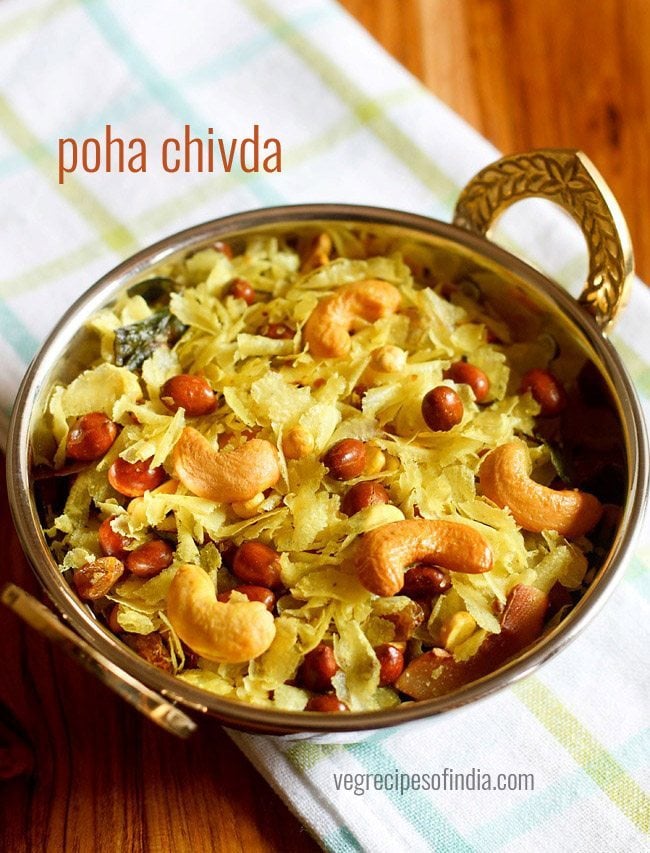
Table of Contents
About Chivda
Chivda is a classic treat that is often enjoyed during the Diwali Festival. There are so many unique ways to prepare these snacks for any and all celebrations, and they are known by several other names like Farsan and Namkeen. The word Namkeen in Hindi means a salted or savory snack.
Typically chivda recipes include a crisp base of dry rice flakes (poha) or puffed rice or lentils or sev or potato strands/sticks or makhana (foxnuts) that’s cooked and combined with a variety of nuts, dried fruits, and fragrant spices.
Here I am sharing with you a Maharashtrian style chivda or namkeen recipe that is vegan and addictively delicious. It’s my personal favorite combination of ingredients for a wonderfully crispy, crunchy, sweet and salty mix of goodness.
In this namkeen recipe I use a blend of cashews and peanuts, plus dried coconut and golden raisins. The mixture is tempered with bold spices, including curry and green chiles, for a terrific balance of flavors.
There are two easy ways this version of chivda can be prepared:
- Pan Roasted Poha Chivda made with thin rice flakes and roasted on the stovetop for a slightly healthier treat.
- Fried Chivda made with thick poha and fried in oil for an even crispier and more decadent snack.
Both recipes are simple to prepare at home in under 30 minutes, so are great to make as a party snack or even for a quick (healthy-ish) evening treat.
However, I will admit that the fried version does taste a bit better simply because it creates a super crispy and crunchy texture. I suggest you give both poha chivda recipes a try and find out which you like more!
How to Make Chivda Recipe
Prep and Roast Poha
1. First, measure all the ingredients and have them ready to go in separate bowls.
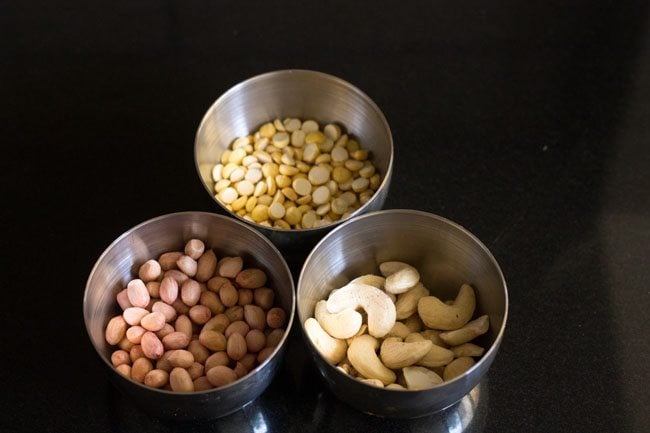
2. Heat a wide, thick bottomed pan or kadai with a handle. Keep the flame to a low. Then add 2 cups of thin poha (thin rice flakes) to the hot pan.
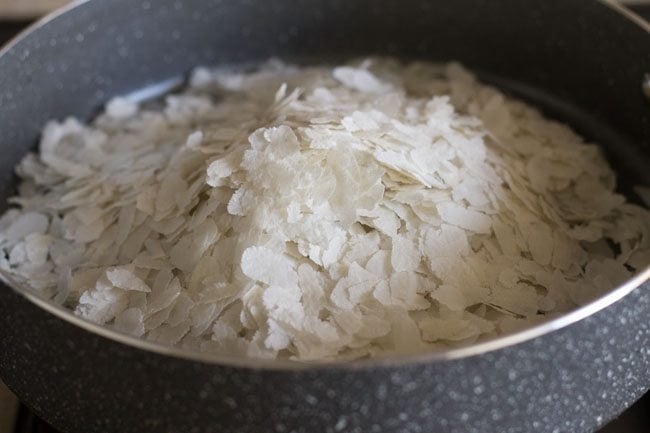
3. Roast the poha. Gently shake the pan while stirring gently so that the poha gets evenly roasted, and do not stir with a spoon. The rice flakes are papery, light and delicate!
Make sure not to overdo the stirring or mixing as this will break the poha.
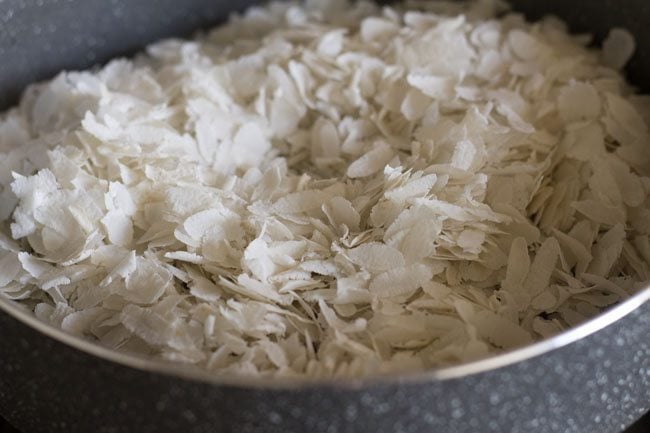
4. Within 3 to 4 minutes the poha flakes will change their texture and become crisp. Again, keep the heat to low and do not roast over high heat. Stir gently.
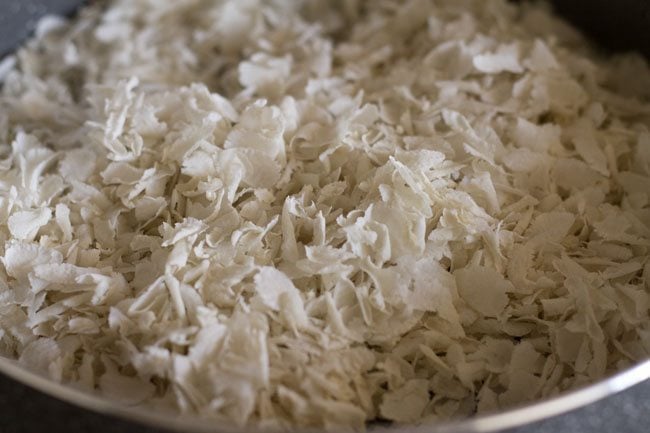
5. Remove the roasted poha on a plate and place aside.
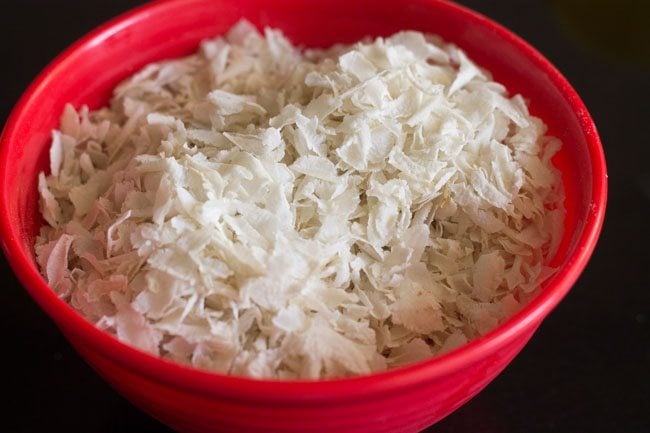
Fry Dry Fruits and Nuts
I have here fried the nuts, lentils and raisins. But you could roast the nuts and lentils in a pan or in the oven or air-fry them.
6. Heat ⅓ cup of oil for deep frying in a small pan or tadka pan. I have used a tadka pan. Alternatively you could use a wide pan and use a heat-proof fine sieve ladle or fine mesh strainer with a handle to fry the nuts.
Add ⅓ cup of peanuts and fry them till they become crisp and crunchy. Stir often while frying.
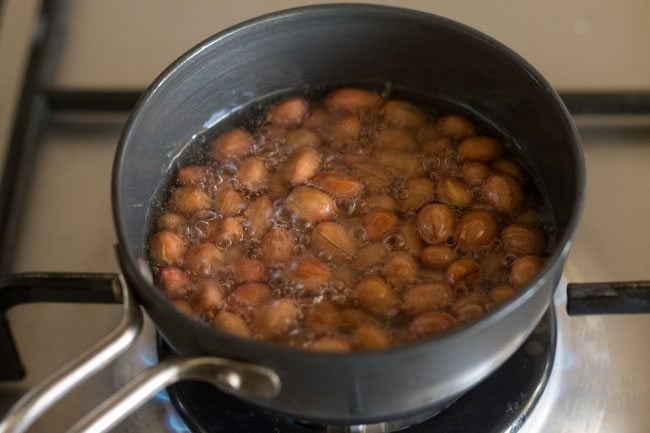
7. Remove them with a slotted spoon. Place in another dish or bowl. You can also place them on kitchen paper towels to absorb any extra oil.
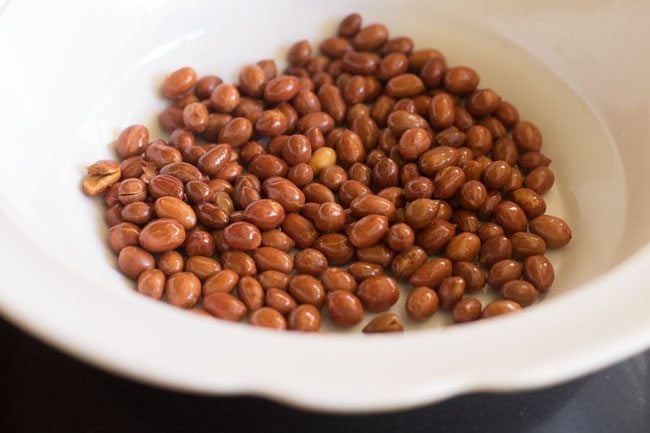
8. Now add ¼ cup dry coconut slices till they become crisp and light golden or golden.
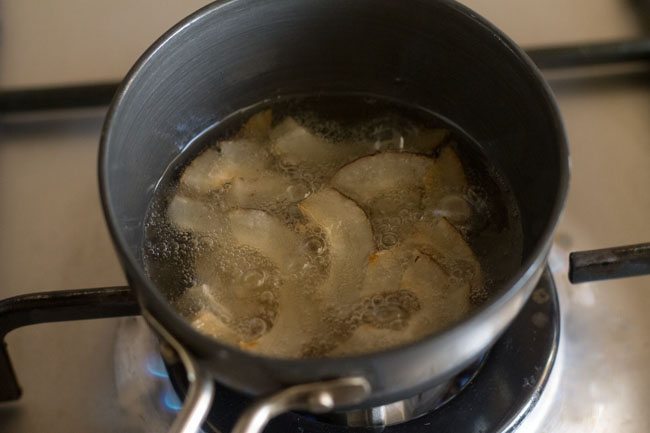
9. Remove them with a slotted spoon. Place in the same dish or bowl where you placed fried peanuts.
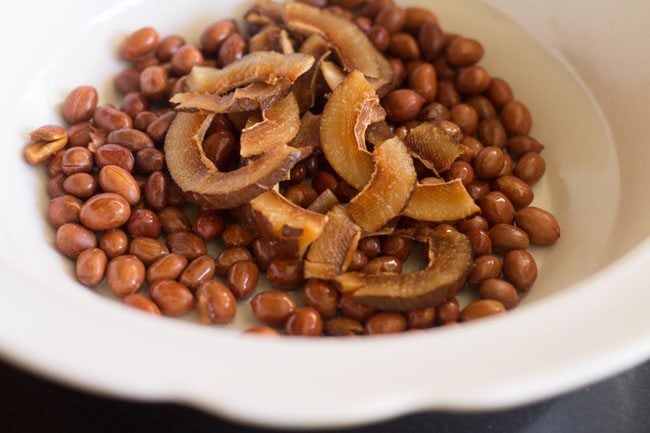
10. Now fry the ⅓ cup of roasted chana dal for some seconds, till they become crisp. Do not brown them.
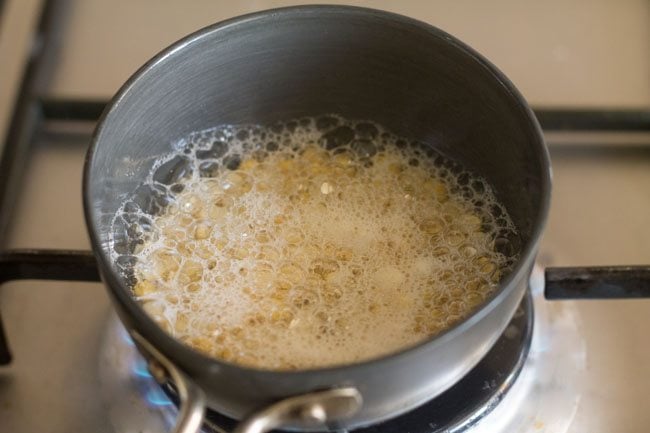
11. Remove them with a slotted spoon. Place in the same dish or bowl.
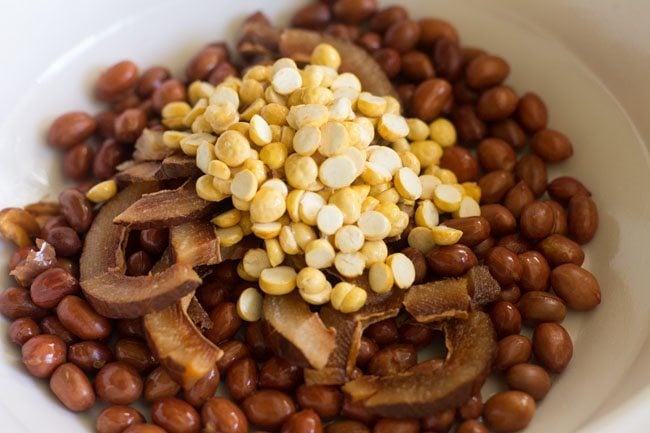
12. Then fry ⅓ cup of cashews till they become crisp.
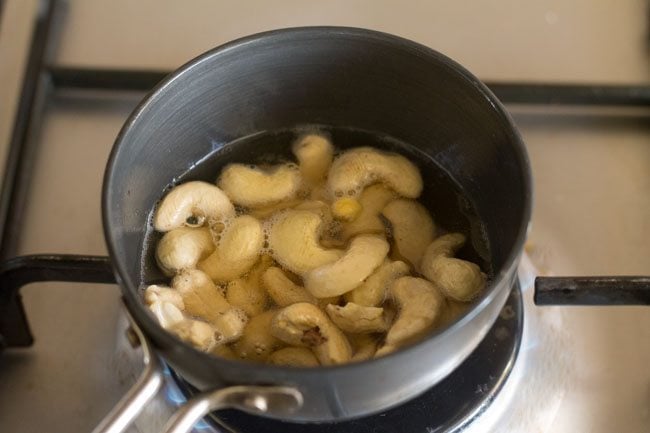
13. Remove the cashews with a slotted spoon. Place in the same dish or bowl.
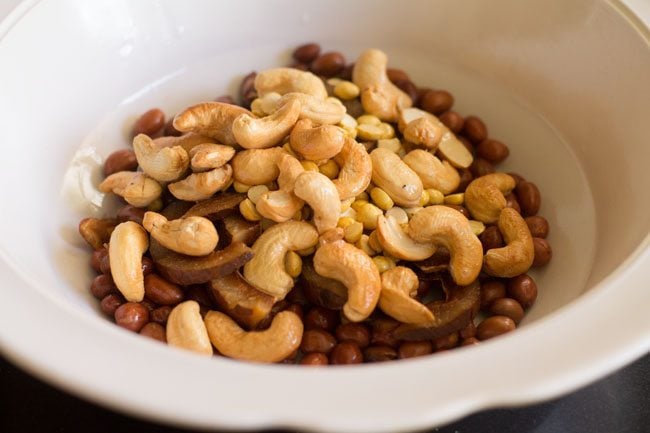
14. Lastly, fry 2 tablespoons of raisins till they swell and become plump.
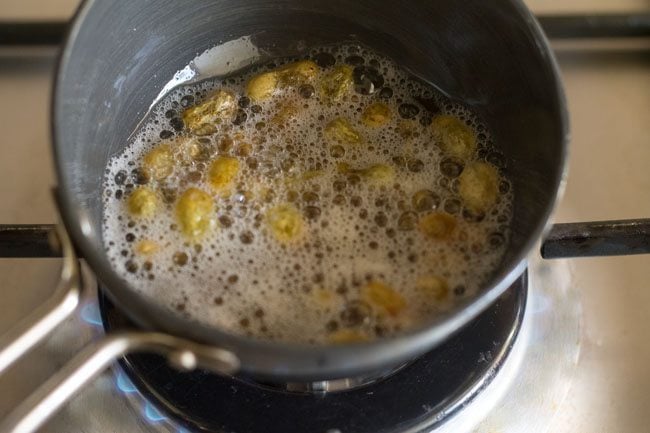
15. Remove the raisins with a slotted spoon. Place in the same dish or bowl where other fried nuts are placed.
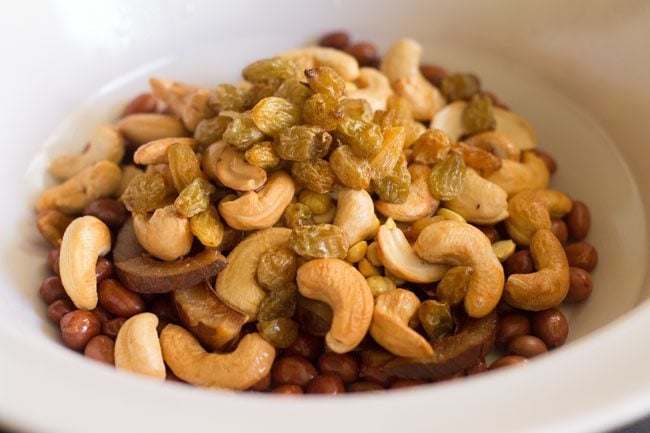
Temper and Make Poha Chivda
16. Now heat ½ tablespoon of oil in the same pan or kadai in which the poha flakes were roasted.
Lower the heat. Add 12 to 14 curry leaves, 2 chopped green chilies and a generous pinch of asafoetida (hing).
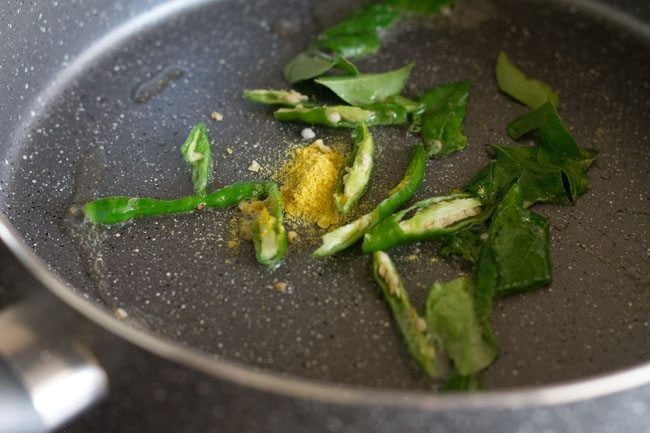
17. Stir and sauté, till the chilies and curry leaves become crisp. Sauté on a low heat.
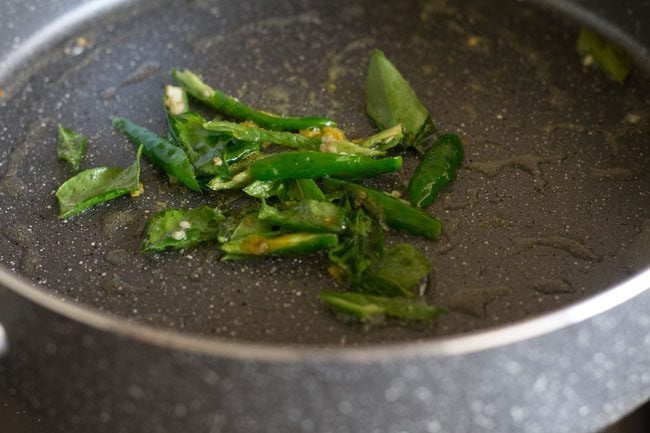
18. Then add ¼ turmeric powder and 1 to 1.5 teaspoons salt or add salt as per taste.
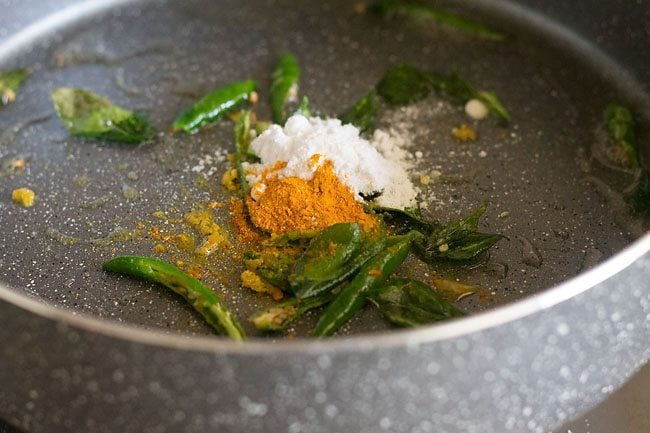
19. Now add 2 teaspoons of powdered sugar.
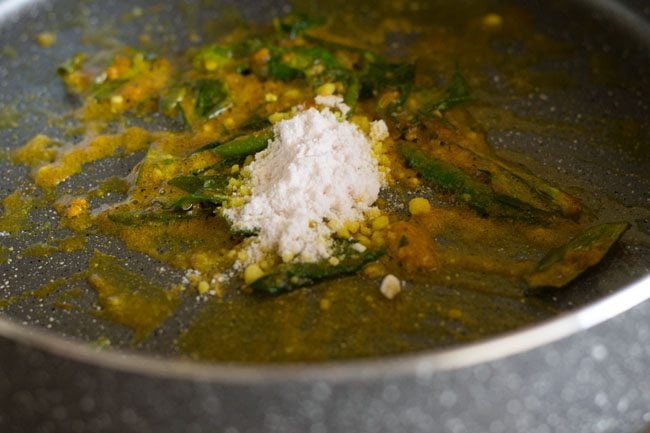
20. Stir and sauté on low heat till the sugar begins to caramelize. Take care not to burn.
Note: If you you do not want to caramelize the powdered sugar, then simply mix it with the rest of the ground spices and herbs.
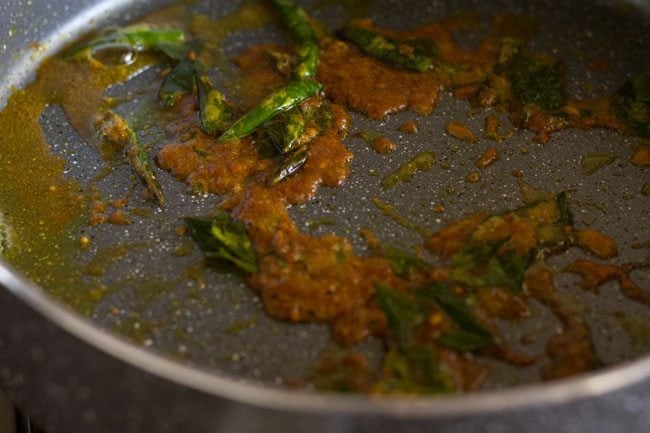
21. Then add the roasted poha along with the fried ingredients – peanuts, raisins, cashews and chana dal.
Shake the pan so that everything gets mixed. Do not stir but you can gently fold the ingredients together if needed.
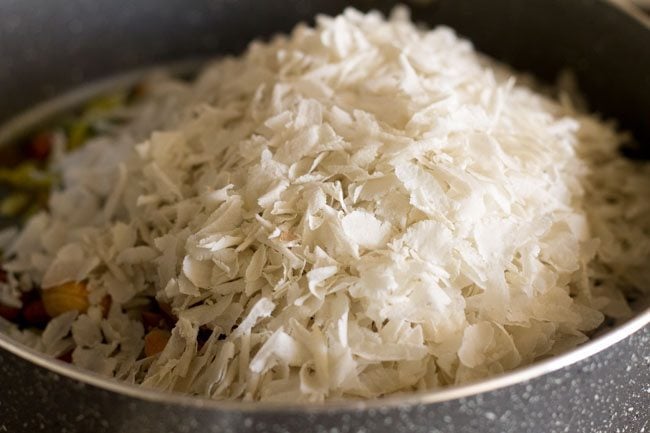
22. Saute for 4 to 5 minutes. Continue to gently shake and mix the chivda.
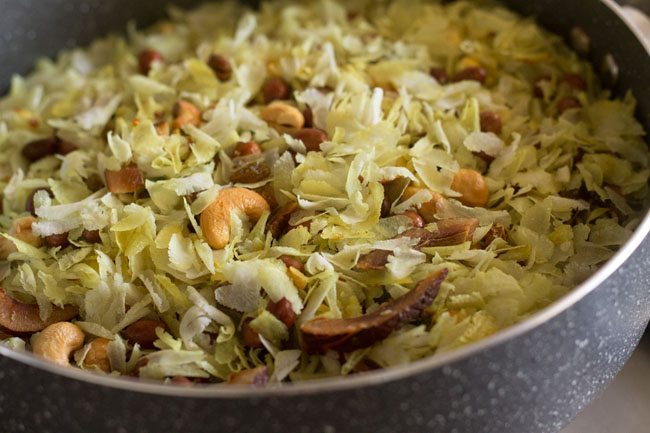
23. Turn off the heat and remove the pan from the hot stovetop. Let the poha chivda sit in the hot pan for 1 to 2 minutes more.
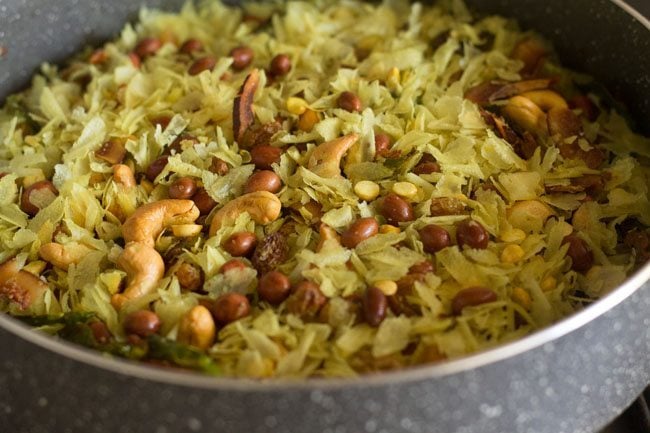
24. Then transfer the poha chivda to another plate and let it cool at room temperature. Once cooled, serve right away as a snack or store in an airtight container to enjoy later.
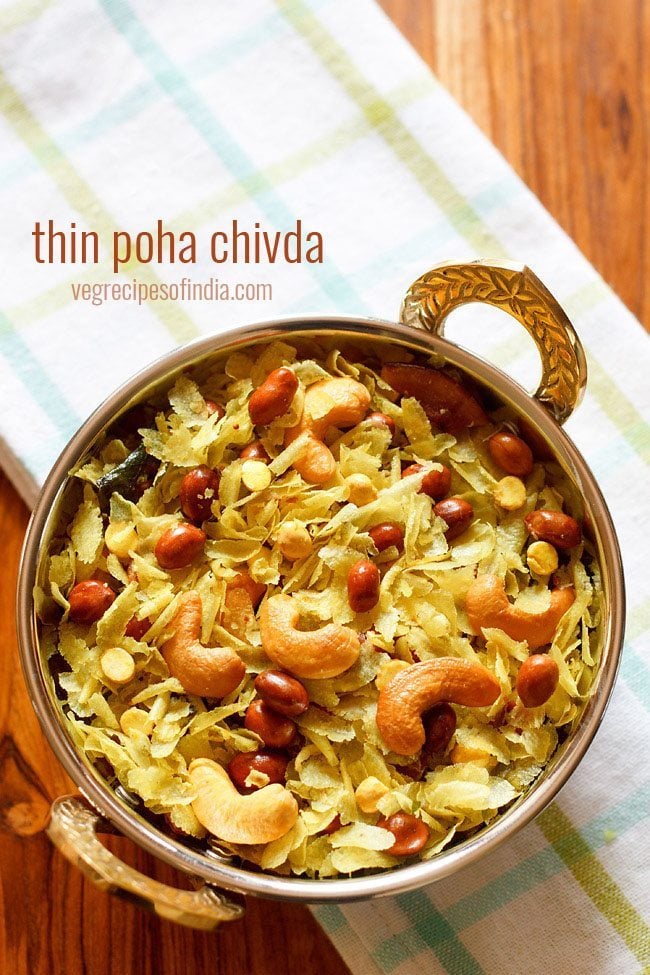
Fried Poha Chivda Recipe
Among many variations of making chivda, this recipe makes use of thick poha or aval (flattened rice), dry fruits and spices and is a Maharashtrian version.
I have skipped adding coconut slices in this one. If you like you can add them.

All the ingredients are fried and this frying obviously makes everything crisp and crunchy and nonetheless they taste delicious too.
For a low-calorie version you can check the step-by-step photo guide of the roasted poha chivda recipe shared above.
Prep Chivda Ingredients
1. First measure and take all the ingredients and keep them in individual bowls or plates.
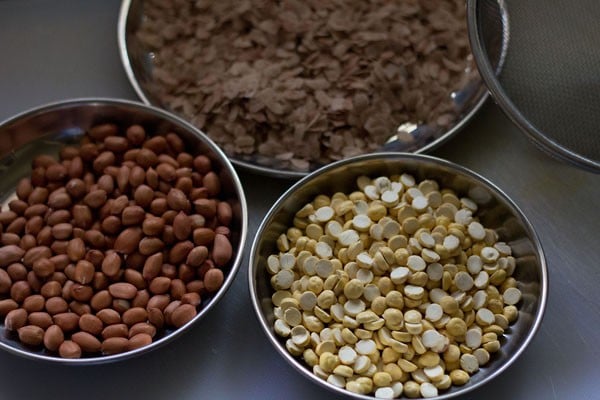
2. Rinse the cashews, raisins (my habit to rinse both of these every time) and curry leaves. Dry them in a clean kitchen towel.
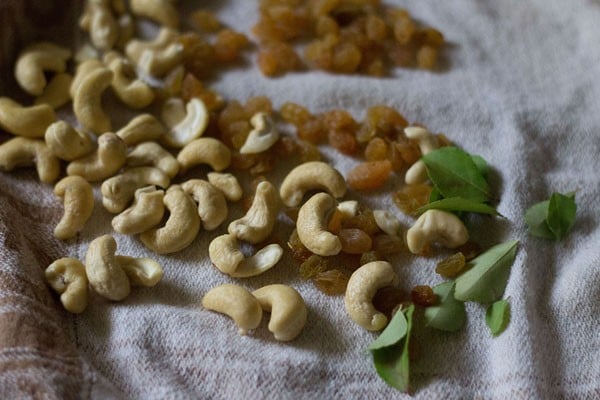
Fry Poha
3. Heat oil till its moderately hot in a kadai. Take half of the thick poha first in a fine sieve or a wired mesh strainer, that is heat proof. Make sure that the fine sieve or mesh strainer has a handle.
Immerse the fine sieve ladle in the hot oil and fry the poha till they expand and become crisp. Don’t brown the poha. I have used red poha.
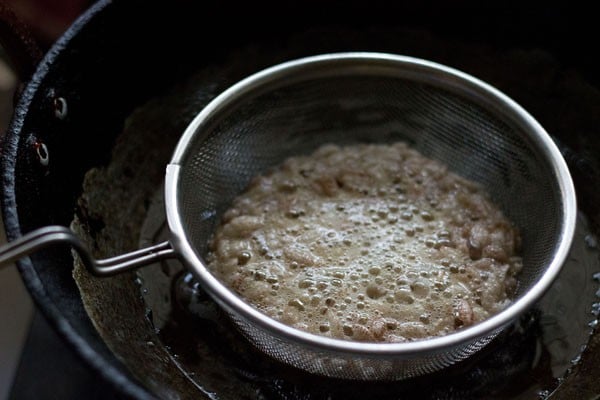
4. For even frying you can stir with a spoon.
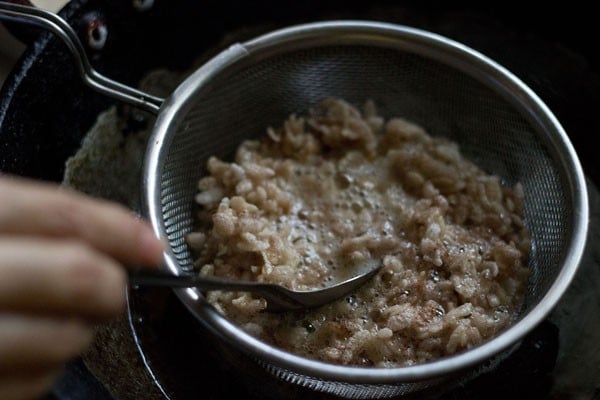
5. Remove and drain the poha on a plate lined with a paper towel.
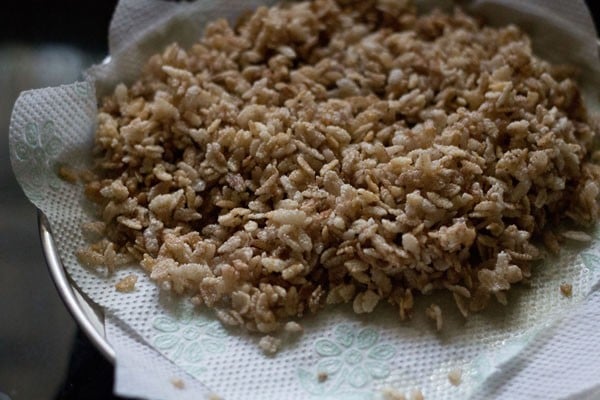
Fry Lentils, Nuts
6. Same way take the roasted chana and fry in the oil till they become crisp. Just for some seconds as they are already roasted.
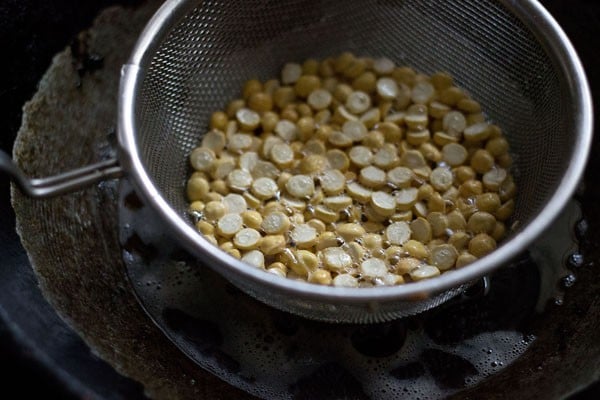
7. Drain on another plate lined with a paper towel.
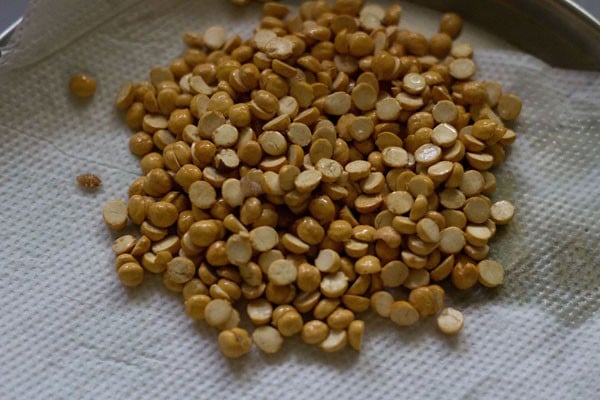
8. Same way fry the peanuts till crisp and crunchy.
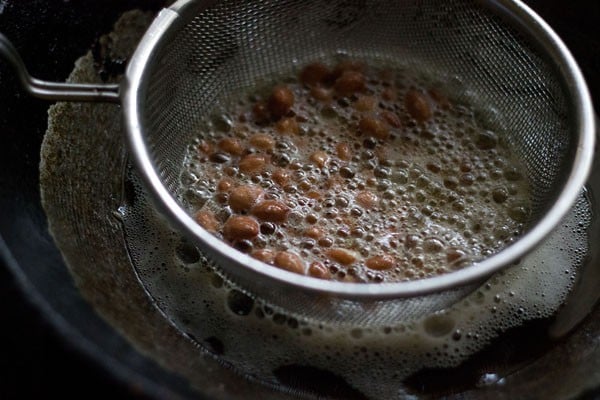
9. Drain them too.
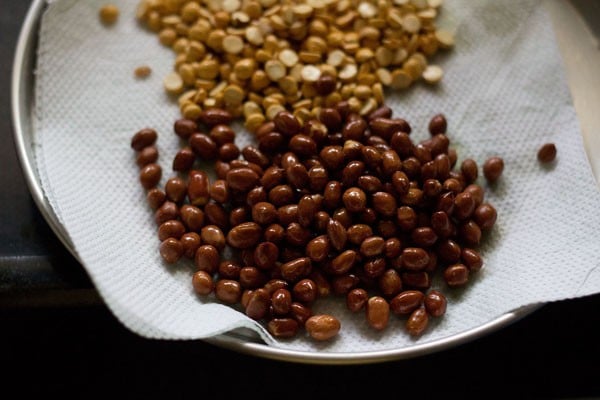
10. Fry the cashews till light golden.
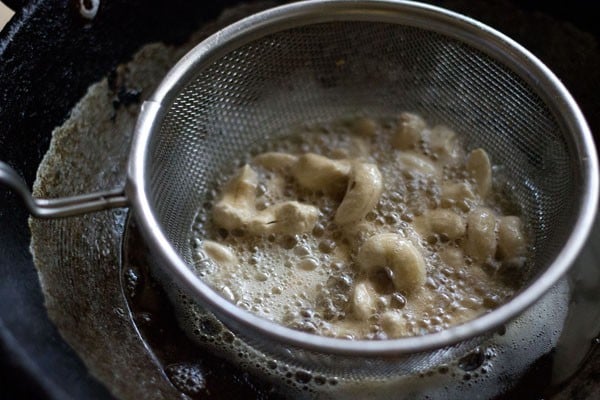
11. Drain the cashews too.
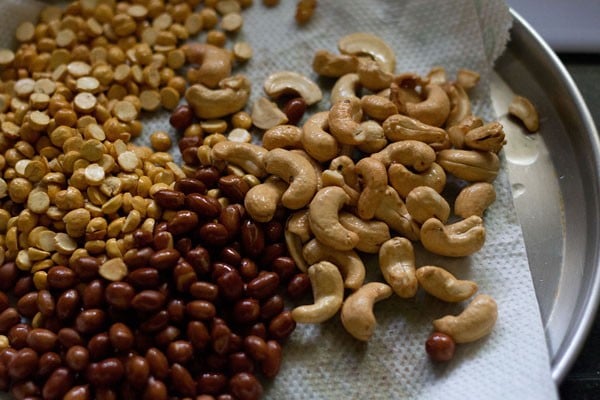
12. Next come in the raisins.
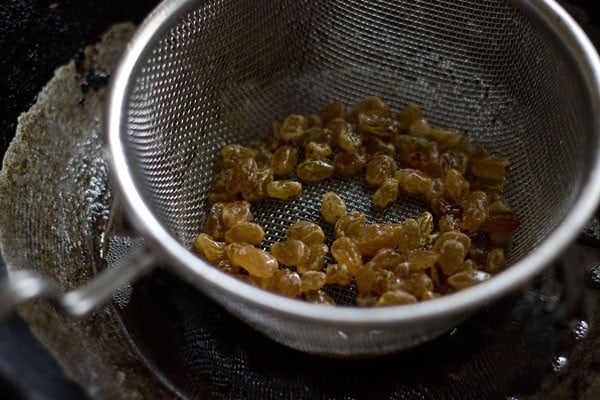
13. Just fry till they become plump and swell. Don’t fry more as they become dense and chewy.
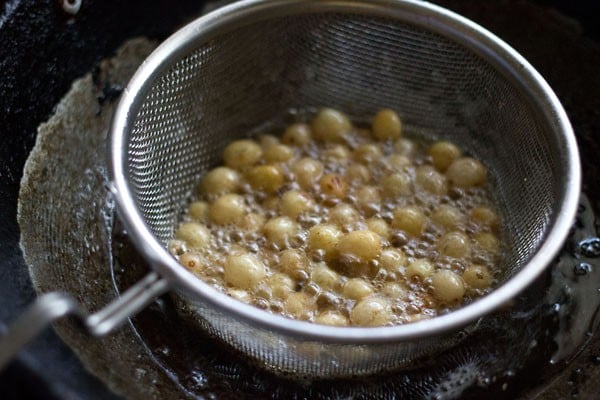
14. Drain the plump raisins.
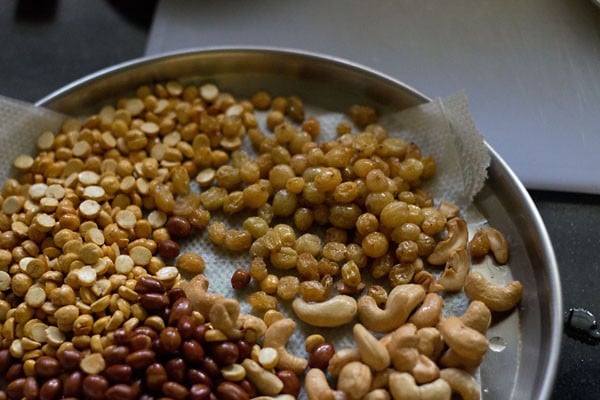
15. Fry the curry leaves also the same way till they crisp. A few seconds. Drain.
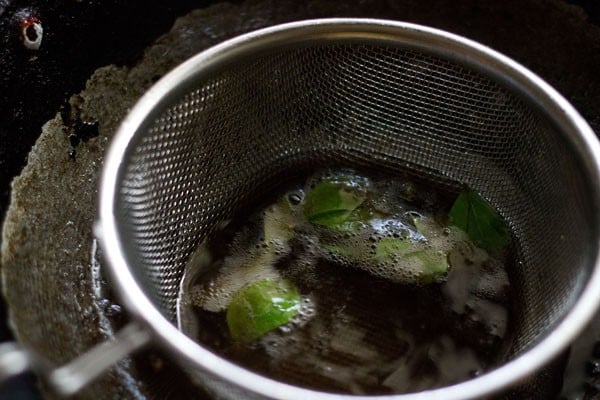
Make Poha Chivda Recipe
16. Heat 1 teaspoon oil and crackle the mustard seeds. Add the cumin and sesame seeds. Fry for some seconds and then add turmeric, red chili powder, asafoetida, finely granulated sugar or powdered sugar and salt. Mix well.
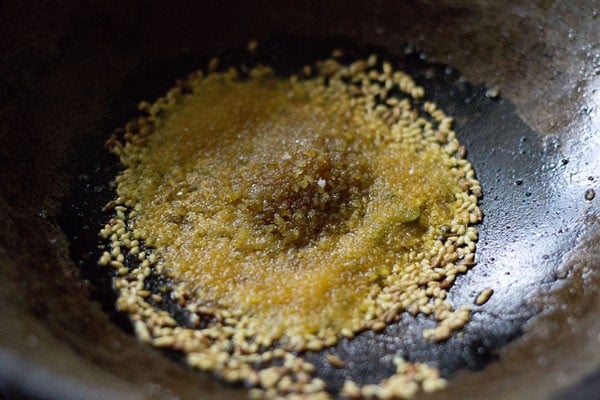
17. Add the fried poha, peanuts, cashew nuts, raisins, chana dal. Crush the fried curry leaves on top. Stir well and roast for 2 to 3 minutes on a low flame. Continue to stir in between.
Check the taste of chiwva mixture and then add more salt or sugar or red chili powder if required.
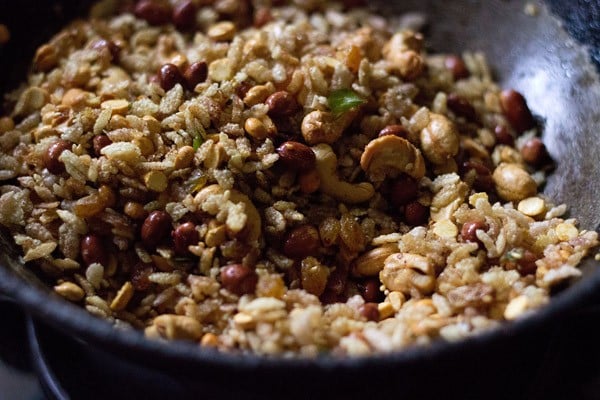
Once the mixture has cooled, Store it in an air-tight container. Serve chivda whenever required as a tea time snack.
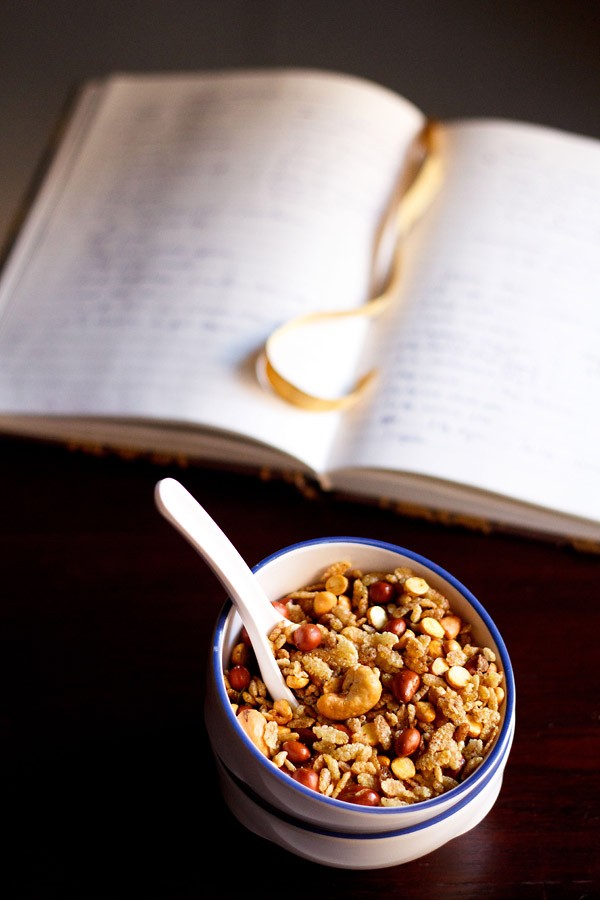
Expert Tips
- These are mildly spiced sweet and savory chivda recipes. You can alter the spices as per your liking.
- When making a namkeen recipe or chiwda with poha or corn flakes or grated potatoes, always use a fine sieve ladle. In Indian markets we get these sieve with a handle and they are very helpful for frying ingredients which have small pieces or flakes. Just one equipment makes the frying process easy and a breeze. So you don’t waste time and energy trying to find out the rice flakes or the chana dal in the oil.
- This cooking process requires a bit of planning. So keep all the ingredients ready.
- Also line two to three plates or bowls with paper towels.
- The sieve should be dry and so the ingredients. You will be frying everything one after the other, so the prep works help and is efficient too.
FAQs
Use a thick bottomed pan or kadai with handles. This will help you to sauté or roast the ingredients without burning.
Because the thin rice flakes are delicate, make sure that stir the chivda gently while tossing and shaking the pan. Always gently stir and toss, shake the pan to combine the ingredients.
When cooking on the stovetop you need to be sure to keep the heat on low. High heat will quickly burn the poha and goodies.
The chivda made with this recipe will keep well for up to a week at room temperature. Be sure to let the mixture cool completely before transferring to an airtight container.
More Namkeen Recipes To Try!
Evening Snacks
Evening Snacks
Evening Snacks
Evening Snacks
Please be sure to rate the recipe in the recipe card or leave a comment below if you have made it. For more vegetarian inspirations, Sign Up for my emails or follow me on Instagram, Youtube, Facebook, Pinterest or Twitter.
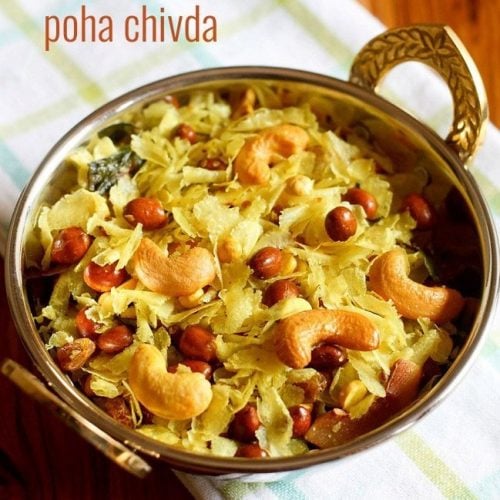
Chivda Recipe | Poha Chivda | Namkeen Recipe
Ingredients
Main ingredients
- 2 cups poha thin variety, (aval or flattened rice)
- ⅓ cup peanuts
- ⅓ cup roasted chana dal (roasted split and hulled chickpeas)
- ⅓ cup cashews
- ¼ cup chopped dry coconut slices – optional
- 2 tablespoons golden raisins
- ⅓ cup oil – can use peanut oil or sunflower oil
For tempering
- 14 to 15 curry leaves
- 2 green chilies – sliced or chopped
- ¼ tsp turmeric powder
- 1 generous pinch asafoetida (hing)
- 2 teaspoons powdered sugar or confectioner's sugar, add as required
- 1 to 1.5 teaspoons salt or add as required
- ½ tablespoon oil – for tempering, can use peanut oil or sunflower oil
Instructions
Roasting poha
- Measure all the ingredients and keep them separately in a plate or bowl.
- Heat a wide, thick bottomed pan or kadai with a handle.
- Keep the flame to a low. Then add 2 cups of thin poha or rice flakes in it.
- Roast the poha. Gently stir and shake the pan so that the poha gets evenly roasted, as a thorough constant stirring with a spoon might break the poha. Since they are papery, light and delicate.
- Within 3 to 4 minutes the poha flakes will change their texture and become crisp. Don’t roast the poha on a high flame. Since on a high flame, the poha may get browned or burned.
- Don’t brown the poha. Remove the roasted poha on a plate and place aside.
Frying dry fruits, nuts and lentils
- Heat oil for deep frying in a small pan or tadka pan. I have used a tadka pan. Alternatively you could use a wide pan and use a heat-proof fine sieve ladle or fine mesh strainer with handle to fry the nuts.
- Add peanuts and fry them till they become crisp. Remove them with a slotted spoon. Place in another dish or bowl.
- Now add the dry coconut slices till they become crisp and light golden or golden. Remove them with a slotted spoon. Place in the same dish or bowl where you placed fried peanuts.
- Now fry the roasted chana dal for some seconds, till they become crisp. Remove them with a slotted spoon. Place in the same dish or bowl.
- Similarly fry cashews till they become crisp. Remove the cashews with a slotted spoon. Place in the same dish or bowl.
- Lastly fry 2 tablespoon of raisins till they swell and become plump in size. Remove the raisins with a slotted spoon. Place in the same dish or bowl where other fried nuts are placed.
Tempering and making chivda
- Heat ½ tablespoon of oil in the same pan or kadai in which the poha flakes were roasted. Lower the flame. Add curry leaves, green chilies and a generous pinch of asafoetida.
- Stir and saute, till the chilies and curry leaves become crisp. Saute on a low flame.
- Then add sprinkle ¼ turmeric powder and 1 to 1.5 teaspoons salt or add salt as per taste.
- Now add 2 teaspoons of powdered sugar.
- On a low flame, stir till the powdered sugar till it is mixed evenly or starts caramelizing.
- Then add the roasted poha along with the fried ingredients – peanuts, raisins, cashews and chana dal. Shake the pan so that everything gets mixed. If stirring, the stir gently and lightly.
- Roast for 4 to 5 minutes. Preferably shake and mix the chivda mixture by shaking the pan. If stirring, then gently stir. Don't apply too much force while stirring else the poha flakes might break.
- Switch off the flame. Let the poha chivda sit in the hot pan for 1 to 2 mins more.
- Then remove the poha chivda in another plate and let it cool at room temperature. Once cooled, then store in an air-tight box and container. It keeps well for about a week.
- Serve the chivda as a tea time snack.
Notes
- For a gluten-free chivda or namkeen recipe, either skip asafoetida or use gluten-free asafoetida that has not been processed with wheat.
- Add less or more of the spices and seasonings according to your taste preferences.
- You can easily double or triple this chivda recipe.
- When the chivda cools at room temperature, then immediately store in an air-tight container or jar so that the poha does not soften.
Nutrition Info (Approximate Values)
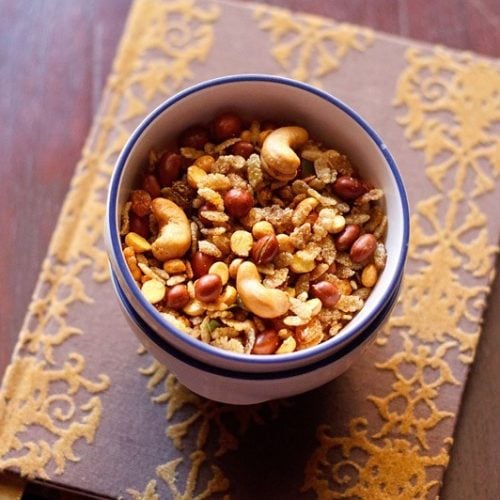
Fried Poha Chivda
Ingredients
- 1 cup poha thick variety – red or white poha (aval, flattened rice)
- ½ cup peanuts
- ½ cup roasted chana dal
- ½ cup cashews
- ¼ cup chopped dry coconut slices – optional
- 2 tablespoons golden raisins
- 10 to 12 curry leaves
- ¼ teaspoon mustard seeds
- ½ teaspoon cumin seeds
- 1 teaspoon white sesame seeds
- ¼ teaspoon red chili powder
- ¼ teaspoon turmeric powder
- 1 generous pinch asafoetida (hing)
- 1 teaspoon powdered sugar or finely granulated sugar, add as required
- 1 teaspoon oil for tempering
- salt as required
- oil for deep frying, as required
Instructions
Preparation
- First rinse the curry leaves, cashews and raisins.
- Dry them in a clean kitchen towel.
- Measure all the ingredients and keep them separately in a plate or bowl.
Making poha chivda
- Heat oil for deep frying in a kadai or wok. Take a heat-proof fine sieve with a handle or a fine mesh strainer with handle.
- Place half of the poha or rice flakes in it. immerse the sieve with the poha in the medium hot oil.
- Fry till they expand and become crisp. Don't brown them.
- Remove the fried poha on a plate lined with paper towel.
- Place the sieve on a dry plate. Add the remaining poha in it.
- Again keep the sieve with the poha in the hot oil and fry till they are crisp.
- Drain them in the same plate.
- Next add the chana dal in the sieve and fry them for some seconds till they become crisp.
- Drain on another plate.
- In the same way fry the peanuts, cashewnuts, raisins, coconut slices and curry leaves.
- Keep all of them separately in a same plate or in separate plates or bowls, lined with paper towels.
- Heat 1 teaspoon oil in another pan. First add the mustard seeds. Let the mustard seeds crackle.
- Then add the cumin and sesame seeds. Let the sesame seeds crackle and change color slightly.
- Switch off the flame. Add the turmeric powder, red chili powder, asafoetida.
- Stir and now add sugar and salt.
- Stir and switch on the flame and add all the fried ingredients – poha, peanuts, raisins, cashews and chana dal. Stir well.
- Crush the fried and crisp curry leaves and add them to the chiwda mixture.
- Stir well and roast for 2 to 3 minutes on a low flame. Continue to stir in between.
- Check the taste of chiwda mixture and then add more salt or sugar or red chili powder if required.
- Let the mixture cool and then store in an air-tight box and container.
- Serve the chivda or namkeen as a tea time snack.
Notes
- You can easily increase the quantity to ½ or 1 cup more, in case you want to have more of the poha and less of the dry fruits.
- The recipe can be scaled easily.
- Add less or more of the spices, sugar and salt as you prefer.
This Chivda Recipe from the archives, first published in October 2016 has been republished and updated on 21 Oct 2022.
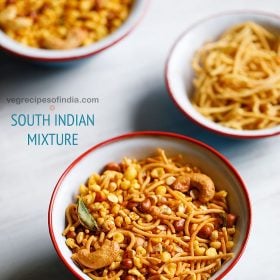
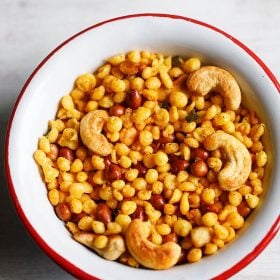
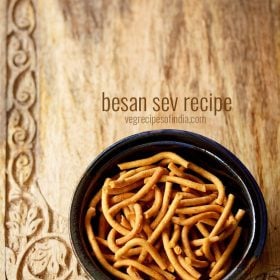
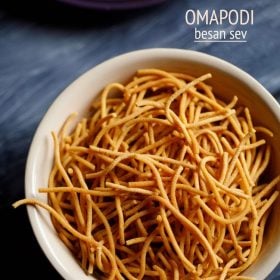








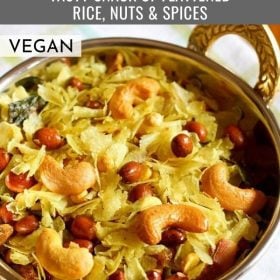
I tired and made the roasted version 3 times now. It has come out nice always. However, have to be extremely careful while putting salt as it becomes salty soon, so put less than mentioned quantity during second and third attempts.
When I caramelised the sugar and added the rest of ingredients, the sugar turned hard , formed lumps and did not mix with rest of the ingredients. Where did I go wrong?
seema, the sugar has cooked too much. just cook it till it melts and then add the roasted ingredients. hope this helps.